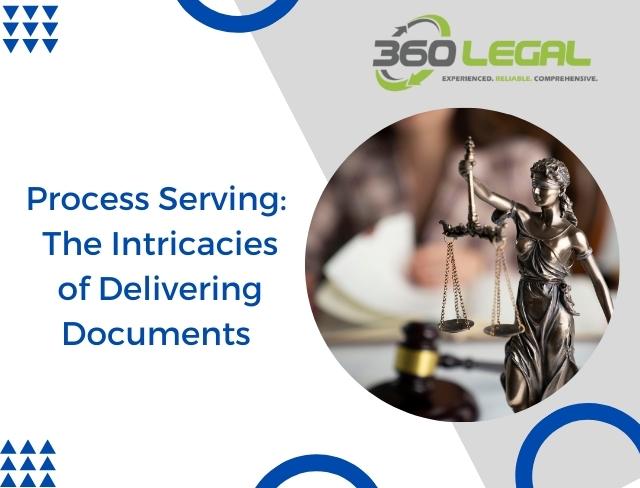Comprehending the Relevance of Process Offering in Legal Procedures
Process serving is a fundamental facet of lawful procedures that ensures all events are informed of their obligations and civil liberties. The subtleties of effective process offering expand beyond plain delivery; they incorporate legal needs and prospective effects of incorrect solution.
Definition of Refine Serving
Refine serving is an essential element of the legal system, specified as the official shipment of legal documents to people entailed in a court instance. This process makes sure that all events are properly educated of lawsuits being taken against them or to which they are an event. Generally, these documents consist of summons, problems, subpoenas, and various other court-related papers that need the recipient's interest and response.
The relevance of procedure offering hinge on its function in upholding the principles of due process. It guarantees that individuals have notice of legal process, thereby giving them a possibility to react or protect themselves. Proper service of procedure is not just a step-by-step procedure; it is a basic aspect of ensuring justness and transparency in the judicial system.
Refine serving can be performed by different individuals, including professional procedure servers, police officers, and even lawyers, relying on administrative policies. Each technique of service has its very own criteria and methods, which are vital to stop delays or terminations within the lawful framework. Comprehending the interpretation and function of procedure offering is vital for all stakeholders entailed in lawful proceedings.

Lawful Demands for Refine Offering
Legal demands for procedure offering are important to guarantee that the delivery of legal records complies with developed protocols and is acknowledged by the court. Each territory has details laws governing exactly how and when files have to be offered, which might include subpoenas, complaints, and summonses.
Normally, process-server should be objective 3rd parties who are not associated with the instance. They have to also follow state laws relating to solution methods, which can consist of personal solution, replacement service, or solution by mail. Personal service includes supplying records directly to the recipient, while substitute solution enables for distribution to one more liable person at the recipient's residence or location of organization.
Additionally, process-server are usually called for to file an evidence of solution, a legal file that confirms the shipment of documents, with the court. This record includes information such as the day, time, and method of service, in addition to the name of the person offered.

Role in the Justice System
An important part of the justice system, procedure serving guarantees that individuals associated with lawful process are effectively alerted of actions taken versus them (Process Serving). This official alert is critical for promoting the concepts of due process, which mandates that events have the opportunity to react to insurance claims made versus them. Without effective procedure offering, the legal system would certainly be made inefficient, as individuals might take part in actions without awareness of pending legal matters
Process-server offer a crucial function in securing the stability of the legal procedure. They work as neutral parties, delivering lawful papers such as summons, issues, and subpoenas, therefore fostering openness and responsibility within the judicial structure. By ensuring that all parties are educated, process serving helps to avoid any possible unreasonable benefit, enabling equitable involvement in lawful proceedings.
Moreover, the professionalism of process web servers contributes to the public's count on the justice system. Their adherence to legal criteria and honest practices strengthens the authenticity of the judicial procedure. Eventually, effective procedure serving is vital in advertising the policy of regulation and making sure that justice comes to all individuals associated with legal disputes.
Consequences of Improper Service
The effects of incorrect solution can considerably undermine the honesty of lawful procedures. Incorrect service can click here to read result in the accused not being aware of the lawful action against them, which may avoid them from reacting properly or presenting their defense.
Additionally, incorrect service can provide court orders and judgments invalid, additional hints forcing the complainant to restart the process, which can be both time-consuming and financially challenging. It can also unlock to charms and obstacles, as the defendant may suggest that they were not appropriately notified of the procedures, making complex the legal landscape further.
Best Practices for Effective Service

Second, timing plays a vital role. Serving papers without delay can prevent hold-ups in lawful procedures and guarantee that all celebrations are notified in a timely fashion. In addition, hiring a specialist process-server can enhance efficiency, as they are trained to guarantee and browse prospective difficulties compliance with regional legislations.
Third, maintaining accurate documents of the service process is essential. Documenting the date, time, and manner of service can give vital evidence if conflicts arise regarding whether service was properly executed.
Final Thought
In final thought, process serving is a vital component of lawful treatments, making certain click here for more info that all events are properly alerted and afforded the possibility to respond. Following legal needs and ideal practices not only supports the concepts of due process but likewise enhances the honesty of the justice system. The effects of incorrect service can bring about substantial hold-ups and problems, highlighting the requirement for efficient procedure offering in promoting fairness and ease of access in lawful disagreements.
The subtleties of effective procedure offering extend past plain distribution; they encompass lawful requirements and prospective repercussions of incorrect solution.Refine offering is an essential part of the legal system, specified as the official shipment of lawful papers to individuals involved in a court situation. Without efficient procedure serving, the lawful system would be made ineffective, as people might engage in actions without awareness of pending lawful matters.
Process web servers serve an essential function in safeguarding the stability of the lawful process - Process Serving. The consequences of inappropriate solution can lead to considerable delays and complications, highlighting the requirement for efficient procedure offering in promoting fairness and availability in legal disagreements